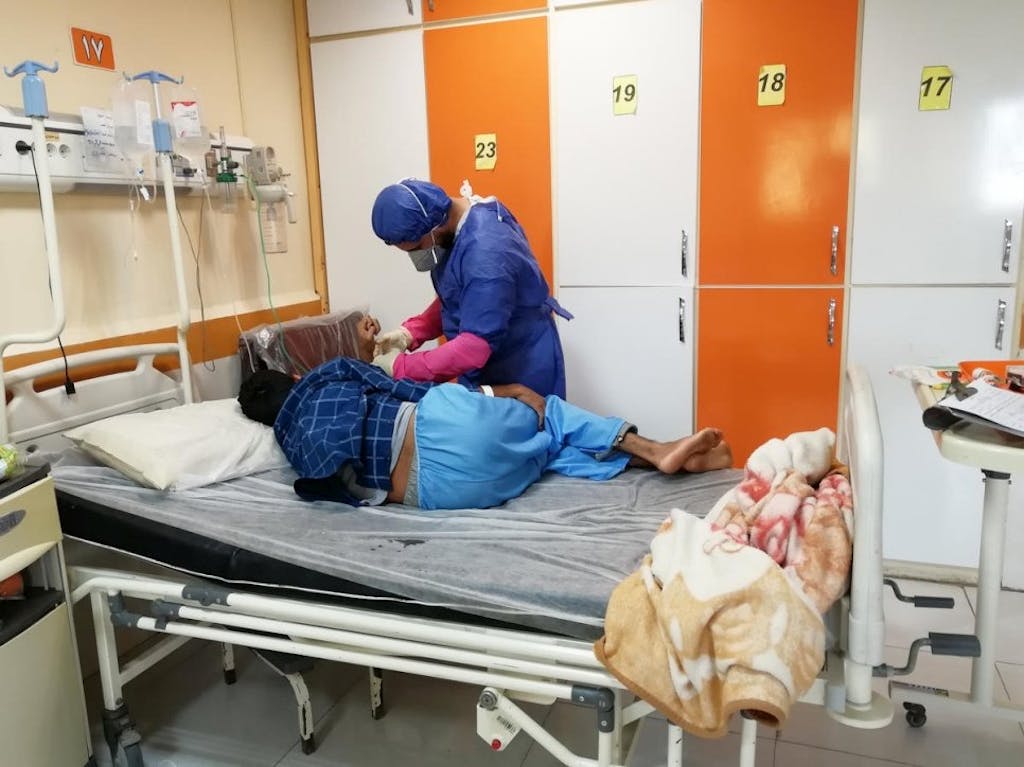With more than 130,000 total confirmed cases of COVID-19, Iran is the epicenter of the outbreak in the Middle East region. Reported new infections are still in the thousands by day, placing a heavy strain on the country’s health care system.
Below is a first-hand account from 24-year-old Iraqi refugee Moheyman Alkhatavi, serving on the frontlines as a nurse in Abadan, a city in Khuzestan, a southwestern province of Iran that has seen a 300 percent increase in new cases since late April.
A recent UNHCR report shows that close to 80 million people, or 1% of the world population, are currently displaced — nearly double the amount reported a decade ago. The UN Refugee Agency, UNHCR, is working to provide medical and hygienic supplies to ensure that nurses such as Moheyman are well-equipped to do their work during the pandemic. On May 21, UNHCR joined the COVID-19 Solidarity Response Fund, and will benefit from a $10 million contribution to support its COVID-19 efforts.
Doctors and nurses wearing surgical masks and gloves dash in and out of hospital rooms, working around the clock to register and check the symptoms of anxious patients filling up every available space in the hospital’s hallways.
Moheyman Alkhatavi, 24, uses a long, cotton-tipped swab to collect cell samples from the nose of a frail, elderly man. “When I administer the COVID-19 test, I pray and hope that it will come back negative,” he said, speaking at the start of a 12-hour night shift.
“The hardest part of my work is to inform families that their loved ones may not make it to the end of the week.”
Moheyman is an Iraqi refugee who works as a nurse at the in-patient ward of the Taleghani Hospital in Abadan, a city in Khuzestan, the Islamic Republic of Iran’s most south-westerly province.
Since the first confirmed case of the novel coronavirus was reported in Iran in the second half of February, the infection has spread at breakneck speed to all 31 provinces of the country. Mirroring what is now happening around the world, the number of people infected has increased sharply each week, and the country’s stock of medicines and medical equipment is constrained.
Moheyman is part of a team of dedicated nurses working tirelessly on rotation to monitor some 50 new patients admitted to the hospital’s quarantine unit each week while they await their test results. He constantly checks his patients’ breathing and other symptoms, trying his best to secure the medicines they need to manage their pain.
“We are all scared, but I choose to still hope. Every day I start my shift hoping that all the required personal protective equipment will be available, but I put my patients first.”
“We had two patients who tested positive but recovered. This is a small ray of light in an otherwise very stressful time.”
There are close to one million refugees in Iran, mostly from Afghanistan and also Iraq. From the onset of the pandemic, the Government of Iran has made every effort to ensure that all refugees have access to the same health services as Iranians, so that they are fully included in the national COVID-19 response.
With over 80 percent of the world’s refugee population living in low- to middle-income countries, many of which have weaker health care systems, UNHCR, the UN Refugee Agency, is prioritizing steps to prevent potential outbreaks that would put extraordinary strain on already fragile local health services.
Moheyman said he feels proud to be able to help both people in the host community and his fellow refugees during the public health emergency that has engulfed the country.

“I remember people telling me that, because I was a refugee, I shouldn’t dream to go to university and instead focus on learning an easier trade,” he says. “But I wanted to make a difference in people’s lives.”
To support the Government of Iran in addressing critical shortages in the country’s health care system, UNHCR airlifted some 4.4 tons of much-needed medical aid items in late March, including medicine to support the COVID-19 response
UNHCR continues to work closely with its government counterparts, other UN agencies including the World Health Organization (WHO), and national and international NGO partners to raise awareness of key prevention measures amongst refugees and host communities.
This piece originally appeared on UNHCR.org and has been edited and republished with permission.
Moheyman’s story illustrates how health workers are at the frontlines of the battle to curb COVID-19 in some of the world’s most hard-hit countries. They are working around the clock to care for patients — often with inadequate supplies of personal protective equipment. Nurses such as Moheyman are part of our lifeline to putting an end to this virus, and they need our support.
That’s why we launched the COVID-19 Solidarity Response Fund. It’s the fastest and most effective way for individuals, companies, and organizations to support the World Health Organization’s work battling the virus.
DONATE TODAY
Every donation makes a difference. Support WHO’s life-saving efforts to respond to the COVID-19 pandemic by giving to the COVID-19 Solidarity Response Fund. Through June 30, 2020, for every $1 you donate here, Google.org will donate $2, up to $5,000,000.






